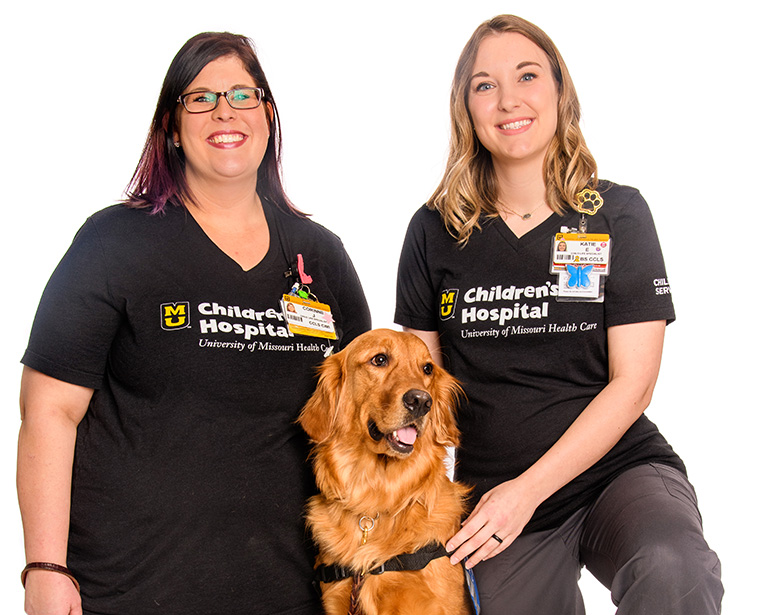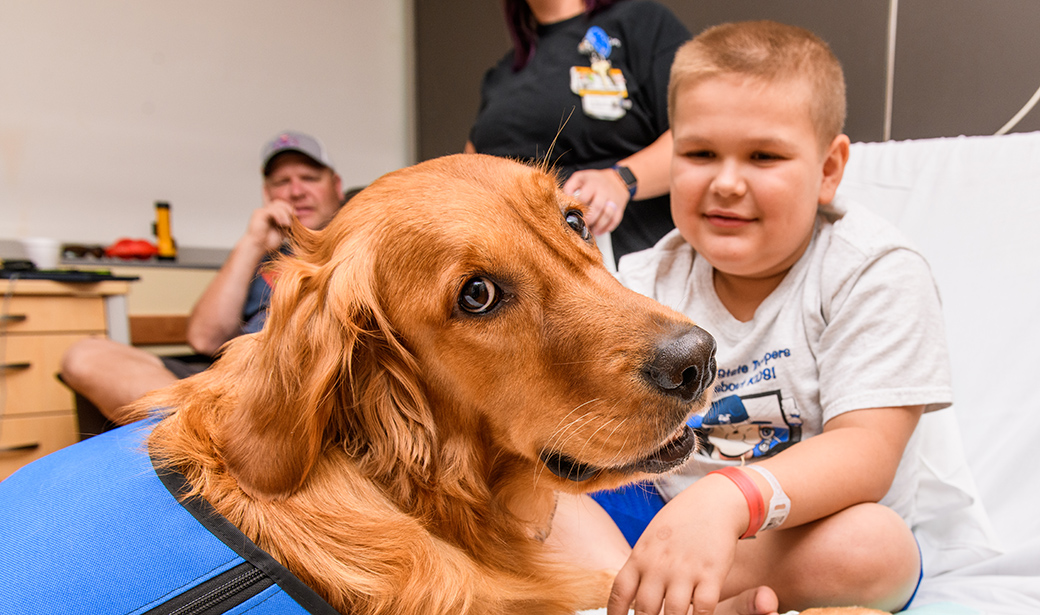As an MU Health Care Child Life specialist, Corinne Joplin spends her days trying to comfort young patients. She is only human, though, and sometimes she needs a little help.
“Some patients are tough eggs to crack. We try to talk with them, but they don’t give you much,” Joplin said. “There was a teenage boy who was really sick. He had been intubated, and when he woke up and had the breathing tube removed, he couldn’t do any of the things he wanted to do. This kid hadn’t really said much. So we told him about Link.”
Link is a 2-year-old golden retriever. He became the official facility dog of MU Health Care’s Children’s Hospital in November 2018. After spending a few months getting used to his new home, Link began visiting patients, including that “tough egg” teenage boy.
“We brought Link in and put him on the bed,” Joplin said. “The boy just started silently crying. He was finally able to let his guard down and process some of his feelings. The nursing staff was tearing up, too. Every day after that, no matter what time of day, he said, ‘Hey, when are you bringing Link by?’ That’s the connection Link builds with patients.”
Link is a graduate of the St. Louis-based Duo Dogs program, a nonprofit organization that trains service dogs. Last fall, Joplin and fellow MU Health Care Child Life specialists spent a week in St. Louis receiving their own training on how to handle a facility dog.
Each weekday morning, Joplin brings Link to work. After the staff determines which patients want to see him and would benefit from a visit, Link makes his rounds. He mostly helps children, but he occasionally visits adult patients, too. His handlers use a blanket as a barrier if he gets onto a bed, and everyone must use hand sanitizer before petting him.
One of Link’s biggest fans is Kale West of Boonville, Missouri. It was a rough summer of 2019 for Kale, who spent four weeks being treated for leukemia at Children’s Hospital. He felt sick a lot and found out he wouldn’t be able to play youth football this year.
“When they offer, ‘Hey, do you want to see Link today?’ it changes his mood,” Gerry West said of his son. “He gets tired of watching TV or playing video games and is in kind of a depression, but when he knows Link is coming, it’s something to look forward to.”
On his final day of inpatient chemotherapy in August, Kale got to pet Link one last time before returning home to his own dog, an Australian shepherd named Sadie. His only regret was he wasn’t able to teach Link to shake.
“I just think it would be a good thing for him to know so he could impress the children,” Kale said. “For someone just meeting Link, for a good impression, Link could do one or two tricks.”
MU Health Care is dedicated to providing patients and staff with the benefits of human-dog interaction, which has been shown to reduce anxiety, pain and blood pressure. The WAGS program includes a team of volunteer owners with certified therapy dogs who visit various MU Health Care facilities. Link is not a part of that program — he’s a full-time employee.
Link helps in three ways: distraction, motivation and comfort. He can distract a patient who is upset about receiving stitches or having blood drawn. He can motivate a child to get out of bed and take a walk. And he can help make an unfamiliar place feel more like home.

“The comment we get a lot is, ‘I am really missing my dogs, and it’s so nice to have one here,’ ” Child Life specialist Katie Ellis said. “That’s the cool thing that we can’t provide, but he can. It’s that human-dog connection of comfort, home and familiarity.”
When he’s not busy seeing patients, Link stays in his kennel in the hospital’s Child Life office. Joplin takes him home with her in the evening.
When she takes off his blue work vest, he lets his fur down and becomes a regular, rambunctious young pooch who loves to run around in the backyard.
When the vest goes back on in the morning, Link knows it is time to be on his best behavior, with one exception. He occasionally unleashes what Joplin calls “man burps.”
“One time I was in the elevator with two people I didn’t really know, and Link let out a huge, loud burp,” Lehman said. “I had to tell them, ‘That wasn’t me.’ ”
Joplin said patients often ask for Link by name, sometimes before they’ve even met him, as word has spread about the hospital’s most popular new addition.
“I ask patients all the time what’s good about being here?” Joplin said. “Far and away, the most common answer is Link.”



